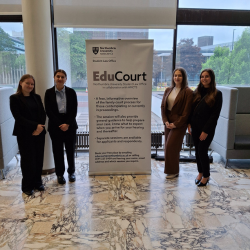-
Study
-
Quick Links
- Course Search
- Fees and Funding
- Unlock Your Potential
- Still time to Apply
- Higher and Degree Apprenticeships
- Continuing Professional Development
- Still time to apply
-
Undergraduate
- UCAS Clearing & Confirmation 2025
- Application Guides
- UCAS Exhibitions
- Foundation Years
- School & College Outreach
- Information for Parents
-
Postgraduate
- Application Guide
- Postgraduate Research Degrees
- Flexible Learning
- Change Direction
- Register your Interest
-
-
International
International
Northumbria’s global footprint touches every continent across the world, through our global partnerships across 17 institutions in 10 countries, to our 277,000 strong alumni community and 150 recruitment partners – we prepare our students for the challenges of tomorrow. Discover more about how to join Northumbria’s global family or our partnerships.
View our Global Footprint-
Quick Links
- Course Search
- Undergraduate Study
- Postgraduate Study
- Information for Parents
- London Campus
- Northumbria Pathway
- Cost of Living
- Sign up for Information
-
International Students
- Information for Students
- International Events
- Application Guide
- Entry Requirements and Education Country Agents
- Global Offices
- English Requirements
- English Language Centre
- International student support
- Cost of Living
-
International Fees and Funding
- International Undergraduate Fees
- International Undergraduate Funding
- International Masters Fees
- International Masters Funding
- International Postgraduate Research Fees
- International Postgraduate Research Funding
-
International Partners
- Agent and Representatives Network
- Global Partnerships
- Global Community
-
International Mobility
- Information for Northumbria Students
- Information for Incoming Exchange Students
-
-
Business
Business
The world is changing faster than ever before. The future is there to be won by organisations who find ways to turn today's possibilities into tomorrows competitive edge. In a connected world, collaboration can be the key to success.
More on our Business Services -
Research
Research
Northumbria is a research-rich, business-focused, professional university with a global reputation for academic quality. We conduct ground-breaking research that is responsive to the science & technology, health & well being, economic and social and arts & cultural needs for the communities
Discover more about our Research-
Quick Links
- Research Peaks of Excellence
- Academic Departments
- Research Staff
- Postgraduate Research Studentships
- Research Events
-
Research at Northumbria
- Interdisciplinary Research Themes
- Research Impact
- REF
- Partners and Collaborators
-
Support for Researchers
- Research and Innovation Services Staff
- Researcher Development and Training
- Research Ethics and Integrity
- University Library - Open Access
- Vice Chancellors Fellows
-
Research Degrees
- Postgraduate Research Overview
- Doctoral Training Partnerships and Centres
- Academic Departments
-
Research Culture
- Research Culture
- Research Culture Action Plan
- Concordats and Commitments
-
-
About Us
-
About Northumbria
- Our Strategy
- Our Staff
- Place and Partnerships
- Leadership & Governance
- Academic Departments
- University Services
- History of Northumbria
- Contact us
- Online Shop
-
-
Alumni
Alumni
Northumbria University is renowned for the calibre of its business-ready graduates. Our alumni network has over 246,000 graduates based in 178 countries worldwide in a range of sectors, our alumni are making a real impact on the world.
Our Alumni - Work For Us
What will I learn on this module?
You will learn advanced academic skills; such as how to use structured approaches to read, note-making, research and writing, transferable skills to ensure academic success in all your other academic modules and enabling you to conduct a critical literature review of employability, graduate marked place informed by career theory (see themes 1,2 and 3 below). Then using advanced research skills, theory and self-assessment tools you will learn how to and choose and apply for a relevant job role and career path, in turn enhancing your employability and transferable academic skills (themes 4 and 5). Finally, you will conclude the module by designing a complete set of graduate application tools for the job role and career chosen and will experience a no of recruitment exercises such as interviews, group exercises and self-branding and presentation to further develop your employability, academic performance and career management skills. The module will be concluded with a theoretical session and a number of practical exercises designed to develop your self-confidence and employability (theme 6).
Theme 1 – Introduction and advanced study skills
1. Introduction to advanced study skills and career development.
2. Searching for and critically evaluating academic and professional sources.
3. Critical analysis of information and data.
Theme 2 – Understanding the graduate labour market and employers
4. Understanding the global graduate labour market.
Theme 3 – What employers want from graduates and how to achieve it?
5. Enhance business awareness, networking, cultural sensitivity and global mind sets.
Theme 4 – Choose career path
6. Understanding and choosing suitable career paths.
Theme 5 – Design career personal development plan
7. Design a career personal development plan using the NU (ELA) framework.
Theme 6 - Recruitment, selection and employability/application tools
8. An introduction to recruitment and selection processes.
9. Development of skills and tools to enable students to demonstrate effective self-presentation.
10. Develop techniques and practice to excel at interviews.
11. Self-confidence and Employability: Conclusions and introduction to the extended critical literature review module that follows.
12. Assignment surgery
How will I learn on this module?
The one-hour weekly lectures will provide you with the theoretical foundation of the module content. This is supported by a two-hour weekly seminar, whereby you will have the opportunity to translate what you have learned theoretically into practice. By doing so, you will immensely benefit from developing a deeper level of learning and proficiency in the acquisition and usage of the core academic learning and employability skills. The interactive approach to sessions will draw upon the directed learning undertaken and your own experiences. The emphasis is on active levels of participation, both individually and within small groups or teams.
The reflective-practitioner approach to learning is built into all sessions to facilitate the development of proficiency based on reflection on knowledge, experience and practice. Through the activities undertaken you will have plenty of opportunities to develop yourself and others by; critically applying theory to ‘real-life’ situations, analyse, and receive and give feedback. These will enable your self-development and to make informed recommendations for the individual development of other students.
Directed learning will centre upon a range of activities including pre-reading, preparation for interactive activities and plenary discussions. Core online tests will be provided for the advanced academic and employability skills elements of this module.
Independent learning will focus on you identifying and pursuing areas of interest in relation to your chosen career path and by acquiring deeper and broader knowledge and understanding through a range of learning activities including extended reading, reflection and research.
The method of delivery will focus on learning by doing (experiential) to facilitate the consolidation and structuring of your theoretical and conceptual understanding, as well as, focusing on the explicit development of your competency level. A global focus on graduate opportunities, tailored academic and employability skills and career development will be key features of your learning.
How will I be supported academically on this module?
You will be supported by a teaching and learning plan, which outlines the formal sessions, together with the tutor-directed study and independent reading for each session.
Additionally, you will be supported by:
? Library resources and search tools to identify relevant articles and subject books.
? The online digital reading list providing a wide range of core journal papers, subject book, digitalised book chapters on the topics of advanced academic skills, employability, career theory and development, selection, recruitment, online testing and professional resources on graduate employment.
? E-learning portal information, including teaching materials, pre-set learning and task completion.
? FAQ on the eLearning portal (i.e. questions will be answered on ELP).
? On-going support and assessment briefs from module and teaching Tutor.
? On-going formative feedback from tutor and peers.
? Further, academic study support is also provided by the module NX 0329 “English for Specific Academic Purposes” (ESAP) – which is relevant to both, international and national level 6 students by adding to the core syllabi delivered by this module
? Relevant academic support is also provided for English development communication skills, through the optional module NX4567 “Business Speaking Communication Skills” (BSCS) – most relevant to international students.
? Programme Leaders to ensure module development within the wider programme development.
What will I be expected to read on this module?
All modules at Northumbria include a range of reading materials that students are expected to engage with. The reading list for this module can be found at: http://readinglists.northumbria.ac.uk
(Reading List service online guide for academic staff this containing contact details for the Reading List team – http://library.northumbria.ac.uk/readinglists)
What will I be expected to achieve?
Knowledge & Understanding:
1. Develop students’ critical thinking, reading and writing skills within the context of employability and career development through the use of academic and professional research (MLO1).
2. Support students to enhance their employability skills and make research- informed career choices by taking into account the graduate labour market and their knowledge, skills and abilities (MLO2).
Intellectual / Professional skills & abilities:
3. Equip students with a sound foundation of academic and employability skills to enhance their wider studies and career prospects (MLO3)
Personal Values Attributes (Global / Cultural awareness, Ethics, Curiosity) (PVA):
How will I be assessed?
1. Summative assessment and rationale for tasks
The module assessment is through a 3000-word portfolio of evidence (CW1) including a critical review of employability literature and graduate labour market (specific focus will relate to individual student’s choice of context and career path underpinned by career theory), a self- assessment against the requirements of a chosen potential employer (& job role) and a detailed 10-year career plan. A complete set of application tools including a CV, covering letter, application form and observers’ interview and group exercises feedback from AoL activities.
As students will be submitting their CV, covering letter and career plan where identifying information is provided, this module should be exempt from the anonymous marking policy. This is consistent with similar modules at levels 5 and 7 which focus on employability and self-presentation.
2. Formative assessment – details of process and rationale
Formative assessment will take place through group work, assignment discussion and reflection, discussion board activity on the e-learning platform, and theory/practice related discussions.
Criteria will be provided to enable participants to understand what is expected of them and how they will be assessed on their performance, this will be presented as a marking rubric.
Students are required to demonstrate reflection, critical self-assessment and reflective practice throughout the module. Throughout the experiential learning individually and in groups, the students are trained and expected to give and receive effective feedback. Tutor feedback will also be provided.
3. Indication of how students will get feedback and how this will support their learning
Feedback on summative performance in this module will be provided as follows: Assignments will be returned with annotated comments directly related to the assessment task. Students will also be provided with a written comment on actions to be taken to improve performance in assessment overall.
Formative feedback will be provided throughout the module, particularly in relation to in-class activities and directed study. The timing of feedback on draft assignments will be clearly labelled within the teaching and learning plan.
The combination of summative and formative feedback will assess ML01, ML02
and ML03
Pre-requisite(s)
None.
Co-requisite(s)
None.
Module Abstract
This module equips you with the necessary knowledge and transferable skills for your future employability, career development and academic studies.
Cognizant that most students on level 6 top up programmes have little or/no experience of higher education in the UK, this module begins by supporting students to understand, enhance and demonstrate research informed advanced academic skills - essential to succeed in the UK higher education and to stand out from the crowd at employment and career development opportunities. You will develop valuable knowledge and skills of the global graduate labour market drawing upon national and international exemplars, whilst exploring key aspects of your knowledge, skills, personality, values, abilities and interests to enable you to make well-informed career choices, develop an appropriate long-term career plan and achieve the job and/or development you aim for.
The module is taught by a combination of lectures/seminars to enable you with deep critical intellectual and experiential development. Detailed directed reading, diagnostics and interactive exercises are contextualised to the countries of intended employment, thus endowing both national and international students with essential transferable employability skills contributing to more successful future careers and/or further education.
Assessment is through a 3000-word portfolio of evidence including a critical review of employability literature, relevant graduate labour market (specific focus relates to individual student’s choice of context and career path underpinned by career theory), a self- assessment against the requirements of a potential employer (and job role) and a detailed career plan. It will also include your designed complete set of application tools i.e. a graduate level CV, covering letter and application form and online test results, interview and group exercises feedback from AoL activities.
Course info
Credits 20
Level of Study Undergraduate
Mode of Study 1 year Full Time
Location Hong Kong
City Hong Kong
Start September
All information is accurate at the time of sharing.
Full time Courses are primarily delivered via on-campus face to face learning but could include elements of online learning. Most courses run as planned and as promoted on our website and via our marketing materials, but if there are any substantial changes (as determined by the Competition and Markets Authority) to a course or there is the potential that course may be withdrawn, we will notify all affected applicants as soon as possible with advice and guidance regarding their options. It is also important to be aware that optional modules listed on course pages may be subject to change depending on uptake numbers each year.
Contact time is subject to increase or decrease in line with possible restrictions imposed by the government or the University in the interest of maintaining the health and safety and wellbeing of students, staff, and visitors if this is deemed necessary in future.
Useful Links
Find out about our distinctive approach at
www.northumbria.ac.uk/exp
Admissions Terms and Conditions
northumbria.ac.uk/terms
Fees and Funding
northumbria.ac.uk/fees
Admissions Policy
northumbria.ac.uk/adpolicy
Admissions Complaints Policy
northumbria.ac.uk/complaints









